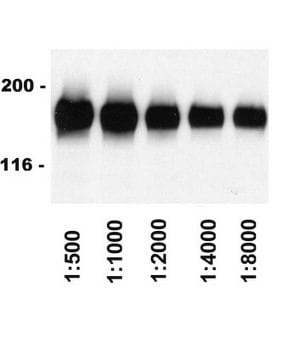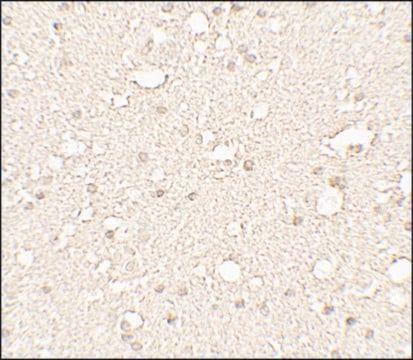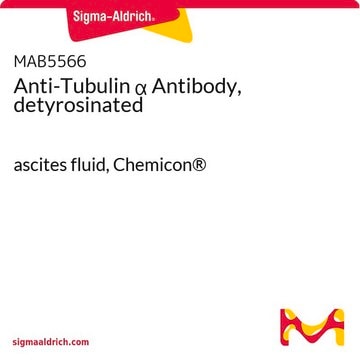ABT170
Anti-alpha Tubulin Antibody, nontyrosinated
serum, from rabbit
Synonyme(s) :
Tubulin alpha-1A chain, Alpha-tubulin 3, Tubulin B-alpha-1, Tubulin alpha-3 chain
About This Item
Produits recommandés
Source biologique
rabbit
Niveau de qualité
Forme d'anticorps
serum
Type de produit anticorps
primary antibodies
Clone
polyclonal
Espèces réactives
mouse, porcine
Réactivité de l'espèce (prédite par homologie)
rat (based on 100% sequence homology), human (based on 100% sequence homology)
Technique(s)
ELISA: suitable
immunocytochemistry: suitable
western blot: suitable
Numéro d'accès NCBI
Numéro d'accès UniProt
Conditions d'expédition
wet ice
Modification post-traductionnelle de la cible
unmodified
Informations sur le gène
human ... TUBA1A(7846)
Description générale
Spécificité
Immunogène
Application
Cell Structure
Cytoskeleton
ELISA Analysis: A representative lot from an independent laboratory specifically detected nontyrosinated alpha Tubulin, and not nontyrosinated alpha Tubulin in an indirect ELISA and in a competitive ELISA (Gundersen, G. G., et al. (1984). Cell. 38(3):779-89.).
Immunocytochemistry Analysis: A representative lot from an independent laboratory specifically detected nontyrosinated alpha Tubulin, and not nontyrosinated alpha Tubulin in TC-7 cells in interphase (Gundersen, G. G., et al. (1984). Cell. 38(3):779-89.).
Qualité
Western Blotting Analysis: A 1:2,000 dilution of this antibody detected alpha Tubulin, nontyrosinated in 10 µg of PCA treated NIH/3T3 cell lysate and demonstrated a loss of signal in untreated NIH/3T3 cell lysate.
Description de la cible
Liaison
Forme physique
Stockage et stabilité
Handling Recommendations: Upon receipt and prior to removing the cap, centrifuge the vial and gently mix the solution. Aliquot into microcentrifuge tubes and store at -20°C. Avoid repeated freeze/thaw cycles, which may damage IgG and affect product performance.
Clause de non-responsabilité
Vous ne trouvez pas le bon produit ?
Essayez notre Outil de sélection de produits.
Code de la classe de stockage
10 - Combustible liquids
Classe de danger pour l'eau (WGK)
WGK 1
Certificats d'analyse (COA)
Recherchez un Certificats d'analyse (COA) en saisissant le numéro de lot du produit. Les numéros de lot figurent sur l'étiquette du produit après les mots "Lot" ou "Batch".
Déjà en possession de ce produit ?
Retrouvez la documentation relative aux produits que vous avez récemment achetés dans la Bibliothèque de documents.
Notre équipe de scientifiques dispose d'une expérience dans tous les secteurs de la recherche, notamment en sciences de la vie, science des matériaux, synthèse chimique, chromatographie, analyse et dans de nombreux autres domaines..
Contacter notre Service technique







